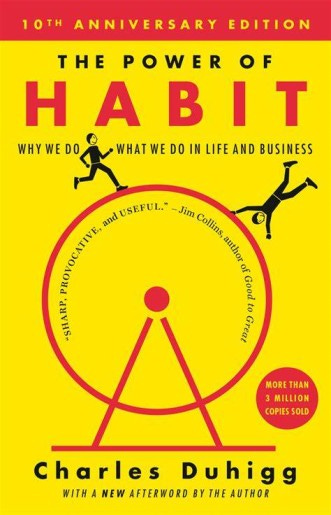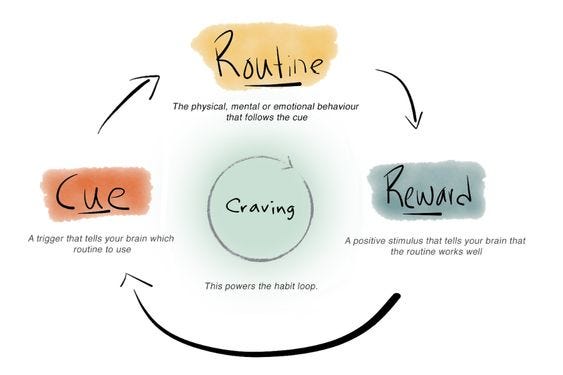Why Habits Exist & How They Can Be Changed
The key to Exercising Regularly, Losing Weight, Being more Productive, and Achieving Success is Understanding how Habits work.
1.1 Goal Setting & Productivity
Happy New Year 2025!
A few years ago, my wife and I had the chance to return home to the Philippines for a visit. While there, a young couple introduced us to two remarkable volunteer opportunities. This unexpected connection led us to the stunning city of Baguio.
Nestled in the mountains, Baguio is known for its cool climate, pine trees, and vibrant culture. It's a place where you can see both modern development and nature's beauty intertwining.
The cool breeze, the scenic views, and the colorful markets all create an atmosphere that feels both familiar and refreshing, making it the perfect backdrop for meaningful work. Unfortunately, it has become more crowded than in the past.
The first opportunity I had was to teach a one-hour interactive seminar to a group of young entrepreneurs, where I shared leadership principles.
The second experience was being invited to a radio show, which was broadcast both locally and internationally through the internet. On the show, I had the privilege of being alongside the city’s vice-mayor.
At the time, I was deeply immersed in the book The Power of Habit by Charles Duhigg. It explores the idea of keystone habits—those foundational habits that have a ripple effect, influencing other areas of our lives.
NEW YORK TIMES BESTSELLER • MORE THAN 3 MILLION COPIES SOLD • This instant classic explores how we can change our lives by changing our habits.
One keystone habit that stood out to me, and that I shared during the interview, was the practice of family dinner.
It's a tradition that many Filipino households used to hold dear, but sadly, it’s becoming less common as family members are increasingly pulled in different directions by individual schedules and distractions.
The concept of a keystone habit is that by focusing on one key behavior, other positive outcomes follow naturally.
Family dinner, for instance, does much more than fill hunger—it strengthens bonds, opens channels of communication, and reinforces values.
When families come together at the dinner table, they not only share a meal but also share stories, challenges, and successes. This simple act creates a sense of unity and belonging.
It’s an opportunity to teach children manners, respect, and empathy, and it fosters a safe space for them to express their thoughts and feelings.
I talked about how the gradual disappearance of this habit from many households reflects a deeper shift, one where families are becoming more disconnected despite living under the same roof.
The power of family dinner as a keystone habit is that it can positively influence so many other aspects of family life.
When parents and children spend that time together, they tend to communicate better, be more aware of each other's needs, and even be more supportive of one another in their individual goals.
It’s not just about sharing food, but about reinforcing the strength of the family unit.
That radio interview was a memorable moment for me. The vice-mayor was so deeply touched by the simplicity yet profound idea that he extended an invitation for us to visit city hall and explore the possibility of launching a family-focused program in his city.
The insights from The Power of Habit provided the perfect framework to share how these small, consistent practices can lead to significant changes, not only in individual lives but in family dynamics as well.
Let’s break down the most transformative ideas and put them into action.
Breaking the Habit Loop: How to Rewire Your Work Routine for Success
Ever feel like you’re on autopilot at work? Like your days blend together, filled with the same meetings, tasks, and routines? That’s because they do. Your brain craves efficiency, and habits make life easier—until they don’t.
This book pulls back the curtain on why we do what we do and, more importantly, how to change it. This book isn’t just about personal habits—it’s a masterclass in transforming workplace culture, boosting productivity, and taking control of your career.
The Habit Loop: Cue, Routine, Reward
At the core of Duhigg’s book is the habit loop—a three-step process that runs your life whether you know it or not:
Cue – The trigger that starts the habit. (A notification pops up on your phone.)
Routine – The behavior itself. (You check social media.)
Reward – The payoff that reinforces the cycle. (A dopamine hit from new likes and messages.)
If you want to change a habit, you don’t kill it—you replace it. Identify the cue, swap in a new routine, and keep the reward intact.
Career Hack: Struggling with procrastination?
Find your cue. Maybe it’s feeling overwhelmed. Instead of scrolling Instagram, replace the routine with a 5-minute task that moves the needle.
Keep the reward—maybe a short break or a quick win that gives you momentum.
The Power of Habit: Why We Do What We Do in Life and Business Paperback – January 7, 2014 4.6/5 of 39,140 ratings at Amazon.com |Kindle $12.99 | Paperback $9.83 |
Keystone Habits: The Game Changers
As I mentioned earlier is the concept of keystone habits—those that spark a ripple effect, influencing multiple areas of your life. Think of them as high-leverage moves that transform your work and career.
Keystone Habit at Work: Prioritization.
Successful professionals don’t just do more—they do what matters most. By consistently identifying the most impactful task of the day and tackling it first, you set off a chain reaction:
You feel accomplished.
You gain confidence.
You set the pace for a productive day.
Start small. Every morning, ask yourself: What’s the one thing that, if completed, would make the biggest difference today? Write it down. Get it done. Watch your career shift.
Small Wins: The Secret to Big Career Leaps
Massive career growth doesn’t come from one big break. It comes from small wins stacked consistently over time. Duhigg explains how even tiny improvements fuel motivation and momentum.
Try this:
Send one email to a mentor or potential opportunity each week.
Speak up once in every meeting.
Learn one new skill for 10 minutes a day.
It doesn’t seem like much—until you realize that compounded effort over a year can change everything.
The Power of Peer Influence: Environment Matters
Want to improve your work habits? Surround yourself with high performers.
Duhigg highlights how environment and social norms drive behavior. If your coworkers complain all day, you’ll likely join in. If your team prioritizes excellence, you’ll level up.
Action Step: Find accountability. Join a mastermind, get a mentor, or simply pair up with a colleague who shares your drive. Your habits will rise to match your environment.
Leadership and Organizational Habits: Culture is Just Collective Habit
Workplaces run on habits. The best leaders know this and intentionally shape them.
Duhigg shares the story of Paul O’Neill, the former CEO of Alcoa, who transformed the company by focusing on one habit: safety. By making safety a priority, other changes followed—efficiency improved, communication strengthened, profits soared.
Lesson for You: Identify one key behavior that could transform your workplace. Maybe it’s clear communication, meeting efficiency, or proactive problem-solving. Champion that habit. Watch the culture shift.
Final Challenge: Your One Habit Makeover
Now it’s your turn. Think of a habit that’s holding you back at work.
Maybe it’s checking emails first thing in the morning, derailing your focus.
Maybe it’s staying silent in meetings, missing chances to shine.
Maybe it’s delaying tough conversations, leading to bigger problems.
Apply the habit loop framework:
Identify the cue. What triggers the behavior?
Change the routine. What’s a better response?
Keep the reward. How can you still get a positive outcome?
Small shifts lead to big results.
Tweak one habit today, and watch your career transform.
The Bottom Line
The Power of Habit isn’t just about breaking bad habits—it’s about designing better ones. Your success isn’t about willpower; it’s about systems. When you master your habits, you take control of your future.
Start small. Build momentum. And remember—you are what you repeatedly do.
Which habit will you change first?
🌻 When you upgrade to a paid subscription, you support my mission to share self-improvement books and online resources that empower children, teens, and young adults in disadvantaged communities through self-education. Together, we can create a lasting global impact!
In the premium version you get these additional resources.
The Podcast Version
The text explains the principles in “The Power of Habit” by Charles Duhigg and provides actionable strategies for applying them in a work setting.
It breaks down the “habit loop” of cue, routine, and reward, offering ways to replace unproductive routines while keeping the reward.
The text also underscores the importance of keystone habits, small wins, and the influence of one's environment to foster career growth. Moreover, the text highlights the role of leadership in shaping organizational habits to transform workplace culture, stressing that culture is just a collective habit.
The Podcast Study Guide
Ultimately, the article advocates for designing better habits, one small shift at a time, to gain control and transform one's career.





